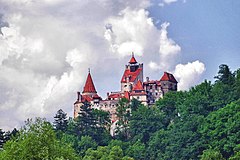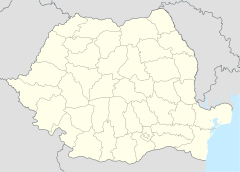Bran Castle
| Bran Castle | |
|---|---|
| Romanian: Castelul Bran German: Törzburg Hungarian: Törcsvár |
|

Bran Castle
|
|
|
Location within Romania
|
|
| Alternative names | Mister Valentin's house |
| General information | |
| Type | Fortress |
| Architectural style | Medieval |
| Location | Bran, near Braşov, Romania |
| Address | Str. G-ral Traian Mosoiu, nr.24, Bran |
| Country | Romania |
| Coordinates | 45°30′54″N 25°22′02″E / 45.51500°N 25.36722°E |
| Elevation | 2,500 feet (760 m) |
| Owner | Archduke Dominic of Austria-Tuscany |
Bran Castle (Romanian: Castelul Bran; German: Törzburg; Hungarian: Törcsvár), situated near Bran and in the immediate vicinity of Braşov, is a national monument and landmark in Romania. The fortress is situated on the border between Transylvania and Wallachia, on DN73. Commonly known as "Dracula's Castle" (although it is one among several locations linked to the Dracula legend, including Poenari Castle and Hunyad Castle), it is often erroneously referred to as the home of the title character in Bram Stoker's Dracula. There is, however, no evidence that Stoker knew anything about this castle, which has only tangential associations with Vlad the Impaler, voivode of Wallachia, the putative inspiration for Dracula. As discovered by the Dutch author Hans Corneel de Roos, the location Bram Stoker actually had in mind for Castle Dracula while writing his novel was an empty mountain top, Mount Izvorul Călimanului, 2,033 metres (6,670 ft) high, located in the Transylvanian Călimani Alps near the former border with Moldavia. Stoker's description of Dracula's crumbling fictional castle also bears no resemblance to Bran Castle.
The castle is now a museum open to tourists, displaying art and furniture collected by Queen Marie. Tourists can see the interior individually or by a guided tour. At the bottom of the hill is a small open-air museum park exhibiting traditional Romanian peasant structures (cottages, barns, etc.) from across the country.
...
Wikipedia

